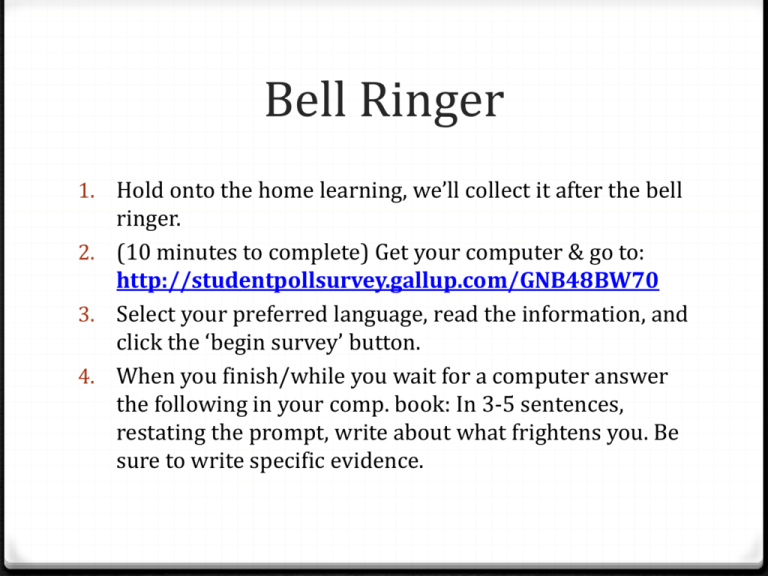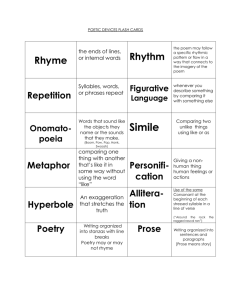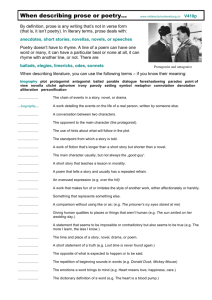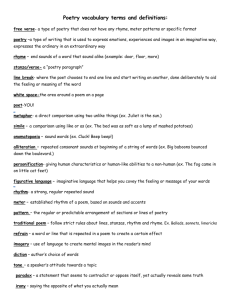Oct. 8th and Oct. 9th Intro to Poetry Power Point
advertisement

Bell Ringer 1. Hold onto the home learning, we’ll collect it after the bell ringer. 2. (10 minutes to complete) Get your computer & go to: http://studentpollsurvey.gallup.com/GNB48BW70 3. Select your preferred language, read the information, and click the ‘begin survey’ button. 4. When you finish/while you wait for a computer answer the following in your comp. book: In 3-5 sentences, restating the prompt, write about what frightens you. Be sure to write specific evidence. Housekeeping ANNOUNCEMENTS: Make-up Monday cancelled next week, but will resume 10/19. Lit. book needed next class HOME LEARNING: If you get a scholarship warning today, have a parent sign it and return it next class. Read (only) Wonder p. 236 – 248. If not finished in class today… Achieve 3000: “Schools Take Steps to Stop Bullies” (article + activity tabs only.) Questions? Intro to poetry Objectives LAFS.6.RL.2.5 (Text Structure – Literary Texts) I can… analyze how a particular sentence, chapter, scene, or stanza fits into the overall structure of a text and contributes to the development of the theme, setting, or plot. Elements of Poetry 0 Poetry is not prose. 0 Prose is the ordinary language people use in speaking or writing. 0 Poetry is a form of literary expression that captures intense experiences or creative perceptions of the world in a musical language. 0 Basically, if prose is like talking, poetry is like singing. 0 By looking at the set up of a poem, you can see the difference between prose and poetry. Distinguishing Characteristics of Poetry 0 Unlike prose which has a narrator, poetry has a speaker. 0 A speaker, or voice, talks to the reader. The speaker is not necessarily the poet. It can also be a fictional person, an animal or even a thing. 0 Example But believe me, son. I want to be what I used to be when I was like you. from “Once Upon a Time” by Gabriel Okara Distinguishing Characteristics of Poetry 0 Similarly to how prose uses sentences to express ideas, 0 Example 1 Once when I was running, From all that haunted me To the dark I was succumbing To what hurt unbearably poetry uses lines. 0 Prose organizes sentences into paragraphs, but poetry groups lines into stanzas. 5 Searching for the one thing That would set my sad soul free In time I stumbled upon it, An inner calm and peace And now I am beginning To see and to believe, 10 In who I am becoming— And all I’ve yet to be. “Self Love” by Lang Leav Stanza 1 Stanza 2 Stanza 3 Rhyme 0 Rhyme is the repetition of the same stressed vowel sound and any succeeding sounds in two or more words. 0 Internal rhyme occurs within a line of poetry. 0 End rhyme occurs at the end of lines. 0 Rhyme scheme is the pattern of end rhymes that may be designated by assigning a different letter of the alphabet to each new rhyme Example “All mine!" Yertle cried. "Oh, the things I now rule! I'm king of a cow! And I'm king of a mule! I'm king of a house! And what's more, beyond that, I'm king of a blueberry bush and cat! I'm Yertle the Turtle! Oh, marvelous me! For I am the ruler of all that I see!” from “Yertle the Turtle” by Dr. Seuss A A B B C C “Penelope” by Dorothy Parker In the pathway of the sun, In the footsteps of the breeze, Where the world and sky are one, He shall ride the silver seas, He shall cut the glittering wave. I shall sit at home, and rock; Rise, to heed a neighbor’s knock; Brew my tea, and snip my thread; Bleach the linen for my bed. They will call him brave. A B A B C D D E E C Connotation and Denotation Connotation - the emotional and imaginative association surrounding a word. Denotation - the strict dictionary meaning of a word. Example: You may live in a house, but we live in a home. Which of the following has a more favorable connotation? 1. thrifty penny-pinching 2. pushy aggressive 3. politician statesman 4. chef cook 5. slender skinny Elements of Poetry When we explore the connotation and denotation of a poem, we are looking at the poet’s diction. Diction – the word choice an author or poet uses. Many times, a poet’s diction can help unlock the tone or mood of the poem. Free Verse 0 Free verse is poetry that has no fixed pattern of meter, rhyme, line length, or stanza arrangement. 0 When writing free verse, a poet is free to vary the poetic elements to emphasize an idea or create a tone. 0 In writing free verse, a poet may choose to use repetition or similar grammatical structures to emphasize and unify the ideas in the poem. I Do 0 Open your lit. books to the poem “Life Doesn’t Frighten Me At All” p. 282 0 Teacher reads first few lines & discusses repetition of phrase “doesn’t frighten me at all” 0 Discuss how repetition affects the structure of the poem. We Do 0 Finish reading the poem as a whole group. 0 Identify various text structures located throughout the poem. 0 Teacher fills out the example chart. “Life Doesn’t Frighten Me” Who is the speaker? A young girl What situation does he/she face? Life How does he/she feel about the situation? She’s fearless and confident in herself. “On Turning Ten” Work Period 0 Now read “On Turning Ten” p. 285 (lit. book) with your elbow partner. 0 After reading discuss the poem’s structure. 0 Fill out the chart together. You may refer back to the example we did together. 0 When you finish, get your computer and complete Achieve 3000: “Schools Take Steps to Stop Bullies” (article + activity tabs only.) Packing Up Checklist #1 - Comp. books returned to bin/computers returned to cart #2 - All your belongings packed up #3 - My supplies neatly returned to where you got them #4 - All trash thrown away & paper recycled #5 - Desks in neat rows #6 - Seated silently waiting for Ms. Barker to dismiss you #7 – (8B only) sit silently during announcements & wet wipe the desks. #8 – (8B only) Stack chairs on desks after the announcements have finished.




